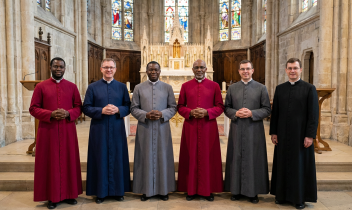
Clergy burnout, often called ministry or church burnout, is a condition of emotional, physical, and spiritual exhaustion impacting pastors and religious leaders. In the quiet of a Sunday morning, the congregation gathers.
The pews are filled with faces, eager for spiritual guidance, looking to their pastor for comfort, wisdom, and strength. The pastor steps to the pulpit, ready to deliver the message that will uplift the community. But behind this act of service, there is often a story of exhaustion, emotional turmoil, and burnout a story rarely told.
The pastoral role, with its constant demands and high expectations, can take a toll on even the most devoted clergy. While their service is deeply fulfilling, it comes at a price. For many, this hidden cost is clergy burnout a phenomenon that affects pastors across denominations and around the world.
In this article, we will explore the unseen struggles of pastoral service, the causes of clergy burnout, and, most importantly, how clergy can take steps toward self-care to preserve their health, faith, and ministry.
A Pastor’s Calling The Weight of Service
For many pastors, the call to ministry is a lifelong commitment. It begins with a deep spiritual conviction, a desire to lead, to teach, and to shepherd others in their faith. But over time, the role evolves into something far more complex than many expect.
Pastors are not just preachers; they are counselors, advisors, community leaders, administrators, and often, a shoulder to cry on. They manage church programs, guide families through weddings and funerals, offer spiritual counseling, and respond to the daily needs of the congregation.
Their work extends far beyond Sunday services, often including late-night calls, hospital visits, and moments of crisis. The role of a pastor can feel all-encompassing. It can be a beautiful life, filled with moments of connection and meaning.
But the weight of this responsibility can also become overwhelming, especially when it is carried alone, with little time for rest, reflection, or rejuvenation.
The Silent Epidemic of Clergy Burnout
Burnout is a term often associated with high-stress professions corporate jobs, healthcare workers, and teachers, for example. But pastors, too, are deeply susceptible to this condition. Many find themselves battling feelings of exhaustion, apathy, and even resentment toward their ministry.
What begins as a passion for service can turn into a draining cycle that leaves the pastor feeling depleted and disconnected from both their community and their faith. Clergy burnout does not happen overnight. It is a gradual process, creeping in over time as the demands of pastoral life continue to mount.
The emotional exhaustion felt by many pastors often stems from the constant need to give: emotionally, spiritually, and physically. Pastors are expected to be “on” at all times, offering support during the darkest moments of people’s lives, and yet, too often, they are expected to do so without the same kind of support.
One pastor shared her experience: “There were days I felt like I was giving everything to others, and there was nothing left for me. I didn’t realize how much I needed to care for myself until I was already running on empty.”
This is a sentiment echoed by many in the ministry. The signs of burnout are often subtle at first, but over time, they become impossible to ignore. Pastors may experience:
- Emotional exhaustion: Feeling drained and incapable of providing further care to others.
- Depersonalization: Viewing parishioners as tasks rather than people, resulting in a lack of genuine connection.
- Physical exhaustion: Persistent fatigue, insomnia, and even physical illness.
- Feelings of inadequacy: Doubting one’s calling, effectiveness, and ability to meet expectations.
Contributing Factors to Clergy Burnout
What leads a pastor down the path of burnout? There are several contributing factors, many of which stem from the very nature of the pastoral role.
- Endless Emotional and Spiritual Demands
Pastors often serve as the emotional and spiritual anchors for their congregations. Whether it’s comforting a grieving family, providing counsel to someone in crisis, or supporting those dealing with addiction or mental illness, clergy are constantly engaged in emotionally draining work. This type of emotional labor is rewarding but can leave pastors feeling empty after long periods of sustained engagement with others’ suffering. - Long Hours and Exhausting Schedules
Unlike most professions that operate on a typical 9-to-5 schedule, the life of a pastor rarely follows predictable hours. Pastors are expected to be available at all times weekends, holidays, and even late-night calls from members of the congregation. The inability to “switch off” and have time for personal rest is a significant contributor to burnout. - Isolation
Despite being surrounded by people, many pastors experience a profound sense of isolation. Pastors are often held to high expectations of spiritual and emotional maturity, making it difficult for them to form close, supportive relationships with others in the congregation. This isolation is compounded by the demands of their roles and the emotional weight they carry, which can create a sense of distance from the very people they are trying to serve. - Pressure of Expectations
Congregations often look to their pastors for guidance in every area of life. From spiritual leadership to family advice, pastors are expected to have all the answers. This constant pressure to meet the high expectations of both the congregation and the church leadership can lead to stress and burnout. - Lack of Resources and Support
Many churches operate on tight budgets, which means clergy members often go without the resources they need for professional development, counseling, or personal retreats. Additionally, without proper support systems in place, pastors are left to navigate the stresses of ministry on their own.
Self-Care
Self-care may sound like a buzzword in today’s wellness culture, but for pastors, it is an absolute necessity. Without it, they are at risk of losing their ability to serve others effectively, which is ultimately detrimental to the congregation.
Taking time to care for one’s physical, emotional, and spiritual needs is vital for long-term sustainability in ministry. Pastors need to be proactive about self-care.
It isn’t a luxury; it’s a vital part of their ability to continue serving their community with passion and energy. Self-care practices might include:
- Setting Healthy Boundaries
Learning to say “no” when necessary is essential. By setting clear boundaries for work and personal time, pastors can avoid becoming overwhelmed. This might mean scheduling time away from the church or refusing to take late-night phone calls unless it’s an emergency. - Taking Time Off
Regular time off is critical for replenishing emotional and spiritual reserves. Pastors should make sure to take vacations, sabbaticals, or simply time off for rest and renewal. It’s okay to take a step back to refocus and recharge. - Seeking Professional Help
Talking to a therapist or spiritual director can provide clergy with the support they need to work through the emotional and spiritual challenges they face. Regular check-ins with a mentor or counselor can help prevent burnout before it becomes overwhelming. - Physical Health
Regular exercise and adequate sleep are crucial for stress management. Physical activity can boost energy levels, improve mood, and increase mental clarity. A healthy body often leads to a healthy mind, which is essential for pastors who must be mentally sharp and spiritually engaged. - Nurturing Personal Spiritual Life
Spiritual leaders must make time for their own relationship with God. This might mean engaging in personal prayer, reading scripture, or attending a spiritual retreat. The pressures of ministry can easily make pastors neglect their own spiritual needs, but this practice is essential for staying grounded in faith.
How Churches Can Support Their Pastors
While self-care is vital, churches also have a responsibility to support their pastors. They can do this by recognizing the challenges pastors face and providing a supportive environment that prioritizes the well-being of those who serve them.
Churches can help by:
- Offering Sabbaticals: Allowing pastors time away to refresh and reflect.
- Providing Emotional Support: Encouraging open conversations about mental health and offering counseling services.
- Creating a Supportive Congregational Culture: Fostering an understanding of the pressures pastors face and managing expectations.
- Financial Support: Offering fair salaries and providing benefits to ensure that financial stress does not contribute to burnout.
- Encouraging Community Building: Promoting relationships with other clergy members or mentors can help reduce isolation.
Conclusion
The journey of pastoral service is a noble and deeply rewarding one, but it comes with its share of challenges. By understanding the signs of burnout, prioritizing self-care, and creating a supportive church environment, pastors can continue to thrive in their ministry for years to come.
Self care isn’t just a personal responsibility it’s a shared mission between pastors, congregations, and church leaders. By ensuring their well-being, pastors can continue to guide and inspire others for years to come. For clergy attire and garments, visit Clergy Wear Shop to explore a range of clothing options for your ministry needs.
Takeaway
Pastors, it’s time to prioritize your well-being. Congregations, it’s time to support your pastors. Together, we can create a thriving church that fosters both spiritual growth and emotional health.
FAQs
- What is clergy burnout?
Clergy burnout refers to a state of emotional, physical, and mental exhaustion caused by the constant demands and responsibilities of pastoral service. - How can pastors prevent burnout?
Pastors can prevent burnout by setting healthy boundaries, taking time off, seeking professional support, and practicing physical and spiritual self-care. - What is self-care for clergy?
Self-care for clergy includes activities that nurture emotional, mental, physical, and spiritual well-being, such as taking breaks, exercising, and seeking counsel. - How can churches support their pastors?
Churches can support their pastors by offering emotional support, providing sabbaticals, managing expectations, and encouraging community building among clergy.
5. Why is self-care important for pastors?
Self-care is crucial for pastors to maintain their physical, emotional, and spiritual health, allowing them to continue serving their communities effectively.








Recent Comments